Tips N Tricks For Cool Kids Add Your Own Tips If You Got Em!
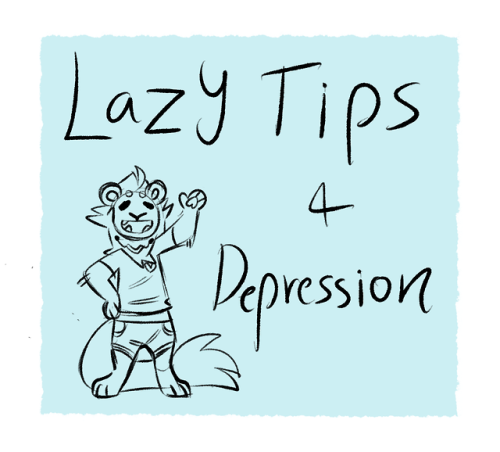
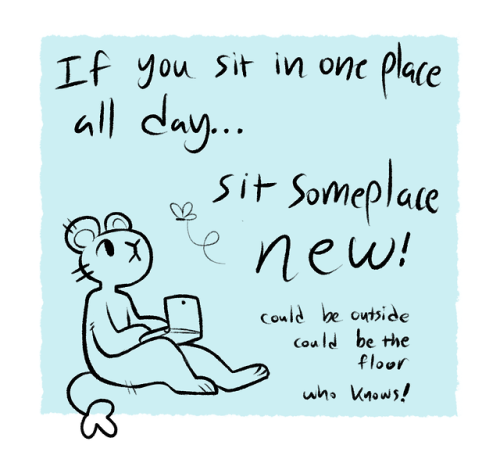
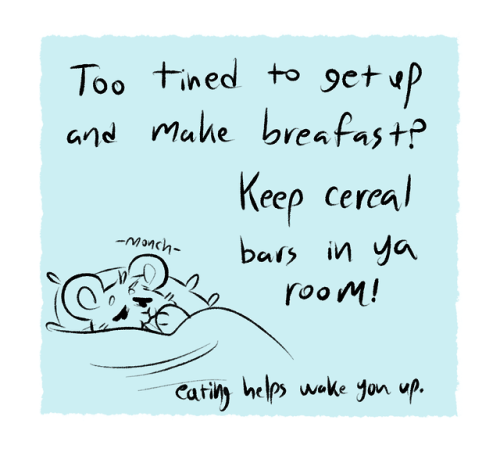
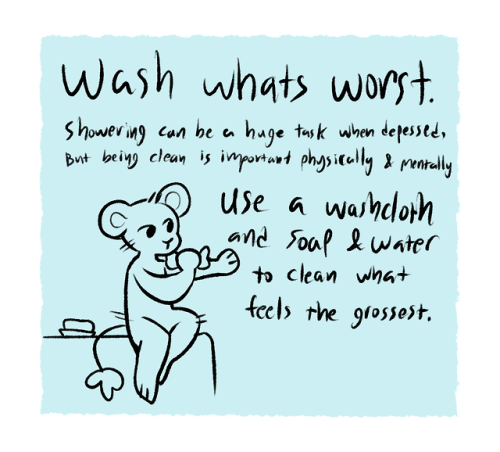


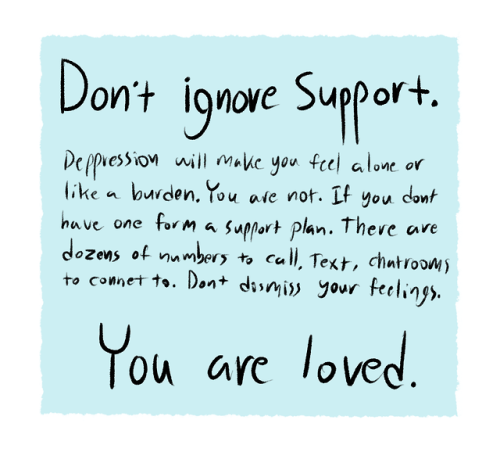
tips n tricks for cool kids Add your own tips if you got em!
More Posts from Zella-rose and Others
Hey friend, in case no one told you today:
I just thought it may be a good time to tell you that you did great today. Even if things weren’t perfect, you did your best.
I see your hard work and I see how much it took to do the thing. Great job!
I’m really proud of you.
Levels of relationship, part 1
(Part of my ongoing series of posts on Avoidant Personality Disorder.)
I realized recently that I tend to try and categorize every relationship I form. Here’s how that breaks down.
Variables of a relationship
The quantity of time I spend feeling safe vs. scared with them
Past evidence of them being judgmental or trustworthy
How possible intimate connection seems
How rewarding intimate connection seems
From those variables, we get groups like this.
“Scary” person:
someone I usually feel frightened around
they’ve shown frightening behavior: they’ve treated me or others negatively in the past (acting critical, judgmental, rejecting, or cruel)
Intimacy is impossible.
I will never choose to be vulnerable with them, for any reason.
“Friendly” person:
someone I feel comfortable around
who has NOT shown frightening behavior
Intimacy is possible, but even if I achieved it, I think it has a very low chance of turning out well.
I could choose to be vulnerable with them, but I usually won’t, because it’s not worth the risk.
“Safe” person:
someone I feel comfortable around
who has shown trustworthy behavior in the past: I have been vulnerable with them, and they responded in a kind, supportive, accepting way
Intimacy is definitely possible, and I think it’s likely to have a positive result: they’ll probably be kind and supportive again.
I will probably choose to be vulnerable with them as often as possible.
It’s not this clear-cut or this conscious in real life. But looking at the patterns in my relationships, that tends to be how it divides. When I’m with some people, I feel really, shockingly good; with others, I feel okay; and with others, I feel really bad/afraid.
Who goes where?
For me, I assume most people are “friendly.” Acquaintances who have never frightened me go here. Strangers go here -- for me -- because why would they bother judging me? What are they judging me against?
People who are abusive or who violate my boundaries go in “scary,” of course. But, for me, so do people who are just really opinionated or blunt, because I have such a low tolerance for conflict and hostility. (People vary! Your criteria for “scary/unsafe” or any other group might be totally different, and that’s okay.)
The rarest group is “safe” people.
Because finding someone who’s basically never frightened me, who I’ve risked being open with, and who responded to me in the exact right way to put me at ease and make me feel heard and accepted -- well, that just doesn’t happen very often.
For me, the chances are better if they’re naturally mild and considerate people. And the chances are really good if they genuinely like me.
For more about safe people, you can read part 2 here.
Listen, all you folks out there with AvPD: you’re amazing.
Every day, against all odds, you show up on my dash.
You live in a world that has taught you to feel unwanted, defective, unseen. But you keep on existing anyway.
You’re all warriors. And you are beautifully fierce.
Don’t listen to the voices – those around you, or within you – that say you’re weak or incapable. You aren’t. Because every single day, you are here, fighting and winning. Even in the moments that feel empty and unnameable, you are learning and growing and gathering strength.
I see you collecting these little things that feed your soul. Assembling the tools you need, for the hard work of staying alive and being well.
You are astonishing, and brave, and powerful. Someday, you’ll carve out a life where you can finally become yourself.
You are real. You matter. And you’re not alone.
I’m going to give you the best piece of Adult Life Is Hard advice I’ve ever learned:
Talk to people when things go to shit.
I don’t just mean get it off your chest, although that’s good. I mean: Something’s wrong with your paycheck/you lost your job/you had unexpected emergency car repairs and now you’re broke so your credit card payment is late. Like, not just 15 days late. We’re talking, shit got crazy and now you’re 90 days late with compounded interest and late fees and the Minimum Payment Due is, like, $390, and you’ve got about $3.90 in your bank account. Call the credit card company.
I know it’s scary. I know you feel like you’re going to get in trouble, like you’re gong to get yelled at or scolded for not having your life together. But the credit card company isn’t your parents; they’re just interested in getting money from you. And you can’t squeeze blood from a stone or money from someone who doesn’t have any. So what you do is you call them. You explain you’re experiencing temporary financial hardships, and you’re currently unable to bring your account up to date, but you don’t want to just let it get worse. Can you maybe talk to someone about a payment plan so you can work something out? Nine times out of ten you’ll be able to negotiate something so that at least it’s not just taking a constant, giant shit on your credit score.
- Can’t pay your power bill? Call the power company.
- Can’t pay your full rent? Talk to your landlord.
- Had to go to the hospital without insurance and have giant medical bills looming in your place? Call the hospital and ask if they have someone who helps people with financial hardships. Many do.
- Got super sick and missed half a semester of class because flu/pneumonia/auto-immune problems/depressive episode? Talk to your professor. If that doesn’t help, talk to your advisor.
You may not be able to fix everything, but you’ll likely be able to make improvements. At the very least, it’s possible that they have a list of people you can contact to help you with things. (Also, don’t be afraid to google things like, “I can’t pay my power bill [state you live in]” because you’d be surprised at what turns up on Google!) But the thing is, people in these positions gain nothing if you fail. There’s no emotional satisfaction for them if your attempts at having your life together completely bite the dust. In fact, they stand to benefit if things work out for you! And chances are, they’ll be completely happy to take $20 a month from you over getting $0 a month from you, your account will be considered current because you’ve talked to them and made an agreement, you won’t get reported to a collections agency, and your credit score won’t completely tank.
Here’s some helpful tips to keep in mind:
1. Be polite. Don’t demand things; request them. Let me tell you about how customer service people hold your life in their hands and how many extra miles they’ll go for someone who is nice to them.
2. Stick to the facts, and keep them minimal unless asked for them. Chances are they’re not really interested in the details. “We had several family emergencies in a row, and now I’m having trouble making the payments” is better than “Well, two months ago my husband wrecked his bike, and then he had a reaction to the muscle relaxer they gave him, and then our dog swallowed a shoestring and we had to take him to the emergency clinic, and just last week MY car broke down, and now my account’s in the negatives and I don’t know how I’m gonna get it back out.” The person you’re talking to is aware shit happens to everyone; they don’t need the details to prove you’re somehow “worthy” of being helped. They may ask you for details at a certain point if they have to fill out any kind of request form, but let them do that.
3. Ask questions. “Is there anything we can do about X?” “Would it be possible to move my payment date to Y day instead so it’s not coming out of the same paycheck as my rent?” The answer may be “no.” That’s not a failure on your part. But a good customer service person may have an alternate solution.
Anyway! I hope that helps! Don’t just assume the answer is “no” before you’ve even begun. There is more help out there than you ever imagined.
AvPD and how we control anxiety.
(Part of my ongoing series of posts on Avoidant Personality Disorder.)
So in anxiety disorders, there are “safety behaviors” that are things you do to manage your anxiety.
Like when people with social anxiety are around other people, they’ll play with their phone,
or stay in the bathroom longer than necessary,
or avoid eye contact,
or only go somewhere with another person.
See also: compulsions in OCD.
It’s something you do while you are in the presence of your Feared Thing, to make it less scary/more tolerable. It’s like a buffer.
But I’ve had a hard time figuring out what is the safety behavior in Avoidant Personality Disorder. So much of its actual presence in people’s lives (or at least in mine) seems to be: “terrified of being seen/rejected by others.” And where you have anxiety, you should also be seeing safety behaviors, right? But it’s not really talked about.
Obviously you can just AVOID people as much as possible, and not have to deal with it in the first place. (Like, clearly. I myself am a shut-in, because AvPD.) But what if you’re actually in it, facing this anxiety/threat? What do you do? How do you buffer the fear?
To lower AvPD anxiety, you de-escalate the intimacy.
I bet MOST of us have a kind of hierarchy of “how scary/how close is this type of interaction.” And if something is too scary, what do you do? Bump down the closeness a step.
You stop touching, step away, put a barrier in between you; you reduce the level of contact, from phone, to chat, to text, to email. (This is my hierarchy; yours might be different.) If you’re in a group and their scrutiny is freaking you out while you try to talk to someone, you go off and talk alone. Or if being alone with someone is too scary, you get somebody to go with you.
Online, maybe you size down the chat window or minimize it entirely between replies. You silence the notifications. You fullscreen something else over it. (Maybe you compulsively glance over to see if they’ve responded, like I do.)
If you’re trying to share something about yourself, maybe you choose to give it to them long-form all at once, so you can’t lose your nerve halfway through. Maybe you edit out select details that are Too Revealing, too unique, too you. Maybe you only share it with them when you've both agreed to discuss it immediately, so it isn’t hanging in the air between you.
It’s about this:
controlling how much access (ability to disturb) they have to you
controlling what they get to see
and monitoring how they react
The “safest” situation is one where they have very little access to you; where you only allow them to see a bare minimum of personal details about you; and where you can watch and try to mitigate how they are responding to you/what they think of you.
The most “unsafe” situation is one where
you can’t control how much access they have to you (i.e. you live with them or see them every day, you can’t get away from their influence/moods/judgments, or they have power over some aspect of your life)
you can’t control how much about you they get to see (i.e. no privacy, no boundaries)
and you can’t monitor or affect how they react (i.e. they find out a secret of yours and then abruptly leave, or they just won’t communicate their feelings with you at all, or you aren’t even aware of what they know until they confront you).
(Okay, so full disclosure, I basically just described my entire relationship with my mom. So this theory may have overlap with codependency, abusive relationships, and c-ptsd, rather than being pure AvPD.)
De-escalating intimacy = de-escalating trust.
You’re reducing their ability to hurt you -- you’re making “How much I am forced to trust you” as tiny and inert as possible.
Which is very useful in a situation where the person is actually going to (or genuinely might) hurt you.
But this eventual habit of lowering intimacy, lowering trust, also means creating distance between you and people you might actually like to form a connection with.
Once you are out of an unsafe situation, this --
controlling how much access they have to you, controlling what they get to see, and monitoring how they react
-- is no longer about managing a threat, or danger. It’s about managing anxiety.
And here is what we know: Compulsions, safety behaviors, avoidance ... anything we do to defend against anxiety, is self-reinforcing. The more you do it, the stronger the urge to do it next time.
There’s another thing:
When you avoid every single instance of interpersonal conflict, you never get the chance to learn how to handle it in a healthy way.
So, yes, when you get into a normal, not-dangerous argument with someone, or have to stand up for yourself, or defend your boundaries -- 2 things: You haven’t built up the skills to handle it in a way that feels safe, AND, you’re super sensitized to conflict because it’s rare.
Conflict is actually scary and feels out of control, times 2, on top of your pre-established fear. And that can be emotionally violent enough, that it can actually be traumatizing or re-traumatizing all on its own.
This obviously isn’t the whole story of AvPD. It’s a personality disorder, not just an anxiety disorder. But I bet for some people, including me, this is a huge chunk of it.
ohh my gosh the notes today?! and the nice comments and messages?! everything is so Meaningful and real, y’all are too sweet, honestly! aaaah avoidants <3
Fuck being "cool"! Fuck being "normal"! 2020 will be all about being genuine and kind while learning to respect and embrace our own and other people's harmless differences even when they go against social norms.
when you realize every action you’ve ever taken has been to make sure you occupy as little space in the world as possible, even your lunch order
Hi! Sorry to bother you, but I'm almost certain I have AVPD and I'd like to explain it to my parents, since they've gotten upset over symptoms of AVPD that I've expressed and I want to tell them why I act like that. But they don't really think that PDs are a thing that exists. so how could I explain it to them so that they understand? thank you in advance !!
Hi there anon!
Wow, there’s a lot to unpack here. The most important is probably:
What you want to accomplish by telling your parents
What your relationship with your parents is like
Would you mind sharing a bit more about the situation? You can write more in asks, submit something or just message me, that works too! (And don’t worry, I won’t publish your username either way <3)
Or if you aren’t comfortable with that, I’ll see what advice I can scrounge up as-is =)
People always think you gain trust first and then you’re vulnerable with people. But the truth is, you can’t really earn trust over time with people without being somewhat vulnerable first.
Brene Brown (via samxcamargo)
-
 teeny-tiny-mousey liked this · 1 week ago
teeny-tiny-mousey liked this · 1 week ago -
 mecharockerz liked this · 1 month ago
mecharockerz liked this · 1 month ago -
 ponderedfallout reblogged this · 1 month ago
ponderedfallout reblogged this · 1 month ago -
 ponderedfallout liked this · 1 month ago
ponderedfallout liked this · 1 month ago -
 muddymcmeatz liked this · 1 month ago
muddymcmeatz liked this · 1 month ago -
 theos-door liked this · 1 month ago
theos-door liked this · 1 month ago -
 nonbinarymissingno reblogged this · 1 month ago
nonbinarymissingno reblogged this · 1 month ago -
 naydralikessoup liked this · 1 month ago
naydralikessoup liked this · 1 month ago -
 manusinlux liked this · 1 month ago
manusinlux liked this · 1 month ago -
 blinkifudontthink reblogged this · 1 month ago
blinkifudontthink reblogged this · 1 month ago -
 losmozi reblogged this · 1 month ago
losmozi reblogged this · 1 month ago -
 pep-tides liked this · 1 month ago
pep-tides liked this · 1 month ago -
 k13xk3k5 liked this · 1 month ago
k13xk3k5 liked this · 1 month ago -
 rexcake liked this · 1 month ago
rexcake liked this · 1 month ago -
 benreyfaggot reblogged this · 1 month ago
benreyfaggot reblogged this · 1 month ago -
 ohabeeeeeee reblogged this · 1 month ago
ohabeeeeeee reblogged this · 1 month ago -
 500cansofsoup reblogged this · 1 month ago
500cansofsoup reblogged this · 1 month ago -
 footlongdingledong reblogged this · 1 month ago
footlongdingledong reblogged this · 1 month ago -
 footlongdingledong liked this · 1 month ago
footlongdingledong liked this · 1 month ago -
 dragonic-solitary liked this · 4 months ago
dragonic-solitary liked this · 4 months ago -
 lireb-librarian liked this · 4 months ago
lireb-librarian liked this · 4 months ago -
 redrose3912 liked this · 5 months ago
redrose3912 liked this · 5 months ago -
 lostrence liked this · 5 months ago
lostrence liked this · 5 months ago -
 ellascreams reblogged this · 5 months ago
ellascreams reblogged this · 5 months ago -
 ellascreams liked this · 5 months ago
ellascreams liked this · 5 months ago -
 corvidcrafts273 reblogged this · 5 months ago
corvidcrafts273 reblogged this · 5 months ago -
 gr3yyyyy reblogged this · 5 months ago
gr3yyyyy reblogged this · 5 months ago -
 gr3yyyyy liked this · 5 months ago
gr3yyyyy liked this · 5 months ago -
 entity375 reblogged this · 5 months ago
entity375 reblogged this · 5 months ago -
 entity375 liked this · 5 months ago
entity375 liked this · 5 months ago -
 eight-cats-in-a-box liked this · 5 months ago
eight-cats-in-a-box liked this · 5 months ago -
 wyvchard reblogged this · 5 months ago
wyvchard reblogged this · 5 months ago -
 luckyicekitsune liked this · 6 months ago
luckyicekitsune liked this · 6 months ago -
 featherandcrystal reblogged this · 7 months ago
featherandcrystal reblogged this · 7 months ago -
 featherandcrystal liked this · 7 months ago
featherandcrystal liked this · 7 months ago -
 ghostlystarwanderer liked this · 7 months ago
ghostlystarwanderer liked this · 7 months ago -
 wyvchard liked this · 7 months ago
wyvchard liked this · 7 months ago -
 themffprince reblogged this · 7 months ago
themffprince reblogged this · 7 months ago -
 themffprince liked this · 7 months ago
themffprince liked this · 7 months ago -
 blueorchid-95 liked this · 7 months ago
blueorchid-95 liked this · 7 months ago -
 blueorchid-95 reblogged this · 7 months ago
blueorchid-95 reblogged this · 7 months ago -
 bifday liked this · 7 months ago
bifday liked this · 7 months ago -
 pandagobrr reblogged this · 7 months ago
pandagobrr reblogged this · 7 months ago -
 pandagobrr liked this · 7 months ago
pandagobrr liked this · 7 months ago -
 toastybites liked this · 8 months ago
toastybites liked this · 8 months ago -
 atlasofthestars113 reblogged this · 8 months ago
atlasofthestars113 reblogged this · 8 months ago -
 atlasofthestars113 liked this · 8 months ago
atlasofthestars113 liked this · 8 months ago -
 vivian-the-catboy reblogged this · 8 months ago
vivian-the-catboy reblogged this · 8 months ago -
 vivian-the-catboy liked this · 8 months ago
vivian-the-catboy liked this · 8 months ago